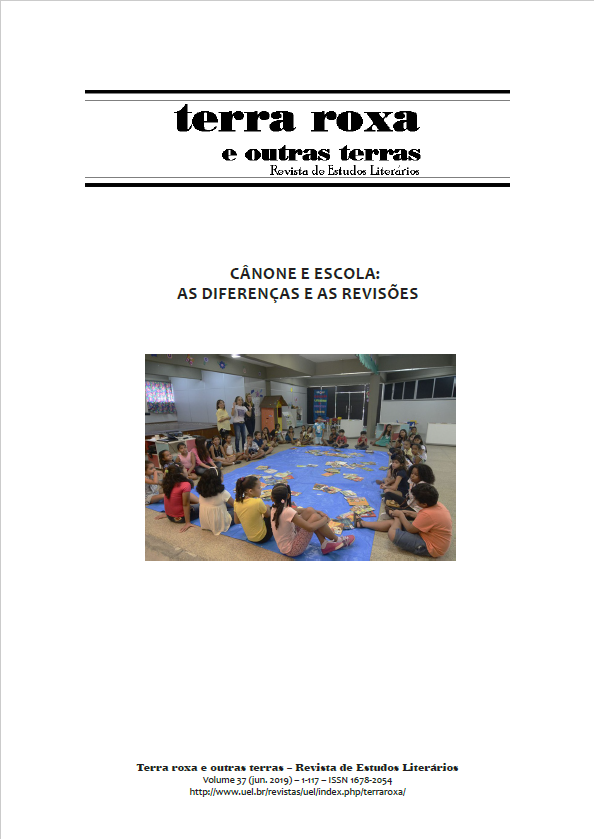(Counter)canons in perspective: terminology and selection in literature and school
DOI:
https://doi.org/10.5433/1678-2054.2019v37p94Keywords:
Canons, Countercanons, Teaching of literatureAbstract
Since the mid-twentieth century to the contemporary present, Cultural Studies emerge as a field of knowledge in European and US universities, resounding later in Brazil and expanding the transversality of frontiers and the ambivalences among areas of knowledge, conceptual constructs and perceptions of sociocultural conjunctures. From this point of view, literary studies return to the canon/non-canon composition as a dynamo both for an exercise in understanding these concepts and for an analytical criticism and reception of texts in traditional instances, such as the educational one. Considering this scenario, the scope of this paper is to approach the tripartite categorization proposed by David Damrosch (2006) for the canonical literary cosmos – hypercanon, countercanon and shadow canon – and, for this purpose, the (post-)modern historical context, based on Marshall Berman (1986) and Terry Eagleton (1998), and the educational system as one of the traditional structures of literary legitimation, according to Márcia Abreu (2006) and Blanca-Ana Roig Rechou (2010), are also presented.Downloads
References
BERMAN, Marshall. Introdução: Modernidade – ontem, hoje e amanhã. Tudo que é sólido desmancha no ar: a aventura da modernidade. Trad. Carlos Felipe Moisés; Ana Maria L. Ioriatti. São Paulo: Companhia das Letras, 1986, pp. 15-36.
CALVINO, Ítalo. Por que ler os clássicos. Por que ler os clássicos. 2. ed. Trad. Nilson Moulin. São Paulo: Companhia das Letras, 2007, pp. 9-16.
CUNHA, Helena Parente. Cânone: dúvidas e ambiguidades. Scripta (Belo Horizonte), v.10, n.19, pp. 241-249, 2. sem. 2006. Disponível em: <http://periodicos.pucminas.br/index.php/scripta/article/view/13978/10980>. Acesso em: 27 jun. 2018.
DALCASTAGNÈ, Regina. Um território contestado: literatura brasileira contemporânea e as novas vozes sociais. Iberic@l: Revue d’études ibériques et ibéro-américaines,(Paris), n.2, Automne 2012. Disponível em: <http://iberical.paris-sorbonne.fr/numeros/numero-2-automne-2012/>. Acesso em: 31 jan. 2017.
DAMROSCH, David. World Literature in a Postcanonical, Hypercanonical Age. Haun Saussy. Comparative Literature in an Age of Globalization. Baltimore: Johns Hopkins U.P., 2006, pp. 43-53.
EAGLETON, Terry. Prefácio. As ilusões do pós-modernismo. Trad. Elisabeth Barbosa. Rio de Janeiro: Zahar, 1998, pp. 5-7.
KLEIN, Kelvin Falcão. Cânone e exclusão. Em Tese (Belo Horizonte), v. 19, n. 2, pp. 111-121, ago.-out. 2013. Disponível em: <http://www.periodicos.letras.ufmg.br/index.php/emtese/article/view/4999/4699>. Acesso em: 27 jun. 2018
MUZART, Zahidé Lupinacci. A questão do cânone. Anuário de Literatura (Florianópolis), n. 3, pp. 85-94, 1995. Disponível em: <https://periodicos.ufsc.br/index.php/literatura/article/view/5277/4657>. Acesso em: 26 jun. 2018.
ORTIZ, Renato. Estudos culturais. Tempo social (São Paulo), v. 16, n. 1: 119-127, jun. 2004. Disponível em: <http://www.scielo.br/scielo.php?script=sci_arttext&pid=S0103-20702004000100007&lng=en&nrm=iso>. Acesso em: 25 jun. 2018.
RECHOU, Blanca-Ana Roig. Educação literária e cânone literário escolar. Trad. João Luís Ceccantini. Letras de Hoje (Porto Alegre), v. 45, n. 3, pp. 75-79, jul./set. 2010. Disponível em: <http://revistaseletronicas.pucrs.br/ojs/index.php/fale/article/view/8124/5814>. Acesso em: 27 jun. 2018.
RUFFATO, Luiz. Literatura e cultura na América Latina. Revista Línguas e Letras (Cascavel), Número Especial, XIX CELLIP, 1º semestre 2011. Disponível em: <http://e-revista.unioeste.br/index.php/linguaseletras/article/view/5525/4197>. Acesso em: 25 jun. 2018.
SANTOS, Eloína Prati. A autoinclusão da literatura indígena contemporânea no cânone brasileiro: uma herança cultural a ser reconhecida. Revista Literatura em Debate, v. 12, n. 22, pp. 107-121, jan.-jul. 2018. Disponível em: <http://revistas.fw.uri.br/index.php/literaturaemdebate/article/view/2922/2531>. Acesso em: 27 jun. 2018.
ZILBERMAN, Regina. Leitura na escola: entre a democratização e o cânone. Revista Literatura em Debate (Frederico Westphalen), v. 11, n. 21, pp. 20-39, jul./dez. 2017. Disponível em: <http://revistas.fw.uri.br/index.php/literaturaemdebate/article/view/2704>. Acesso em: 24 jun. 2018.
ZOLIN, Lúcia Osana. A literatura de autoria feminina brasileira no contexto da pós-modernidade. Ipotesi (Juiz de Fora), v.13, n.2, pp. 105-116, jul./dez. 2009. Disponível em: <http://www.ufjf.br/revistaipotesi/edicoes-anteriores/v13n2/> Acesso em: 27 jun. 2018.
Downloads
Published
How to Cite
Issue
Section
License
Authors who publish in this journal agree to the following terms:
a) The authors retain the copyright and grant the journal the right of first publication, the work being simultaneously licensed under the Creative Commons Attribution-NonCommercial 4.0 International License, allowing the sharing of the work with acknowledgment of the authorship of the work and initial publication in this journal.
b) Authors are authorized to assume additional contracts separately, for non-exclusive distribution of the version of the work published in this journal (eg, publish in an institutional repository or as a book chapter), with acknowledgment of authorship and initial publication in this journal.
c) Authors are allowed and encouraged to publish and distribute their work online (e.g. in institutional repositories or on their personal page) after the editorial process, as this can generate productive changes as well as increase impact and citation of the published work (See The Effect of Open Access).
d) The authors of the approved works authorize the journal to, after publication, transfer their content for reproduction in content indexers, virtual libraries and the like.
e) The authors assume that the texts submitted for publication are of their original creation, taking full responsibility for their content in case of any objection by third parties.



















